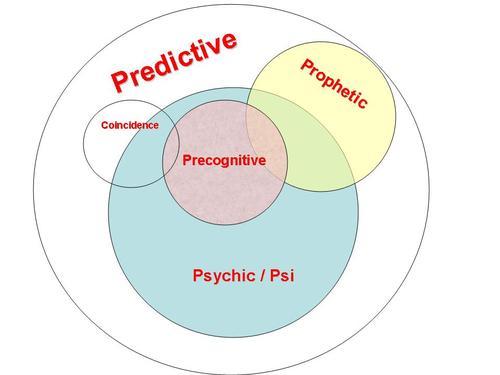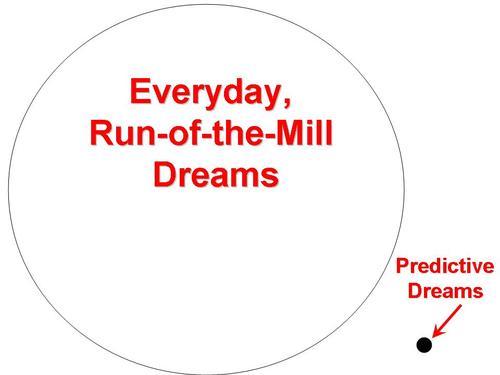Wanna know how to DreamSpeak? This article only covers future-oriented dream topics, which is what the National Dream Center focuses on primarily (for now). Okay, let’s get to it…
Many of the words are synonymous and can be used interchangeably in just about every context. However, some of the more commonly used terms do need to be honored for their differences.
Since the National Dream Center started with the intent of peeking into the future with dreams, this is perhaps the best place to begin. Imagine waking up one morning remembering a dream where a red cat scratches at your front door. Then later, you walk toward the door to leave the house when you see….a red cat. Quick test…
What shall we call your dream?
a. a psychic dream
b. a prophetic dream
c. a predictive dream
d. a precognitive dream
e. a psi dream
f. all the above
g. pure coincidence
h. something else
Incidentally, answer G (pure coincidence) is always on the table, although we’ll save that discussion for the dream philosophy venue. Now is the time to get used to the other terms.
First up, answers A (psychic) and E (psi) are synonymous. ‘Psi’ actually comes from the Greek alphabet that also initiates the word psyche (also Greek), which, according to Merriam-Webster’s Dictionary, means this…
“2. [Greek psychē]
a : soul, personality <the nation’s consumer psyche — D. J. Kevles>
b : mind “
Of course, I couldn’t help but notice their example of the Greek word referring to a nation’s psyche…how apropos for our application at the National Dream Center. The fact that a nation can have a soul-mind-personality really rings a note of C. G. Jung’s insistence of a collective unconscious, but I diverge once again! The bottom line for answers A and E (psychic and psi) is that they are used interchangeably and can be used as both a noun and an adjective (see entry for PSI in the Parapsychological Association’s online glossary).
Answer B (prophetic) is commonly misused as a synonym for the above terms. The top characteristic of a prophetic dream is that it is large scale. Just that descriptor alone eliminates the red cat dream above as a prophetic dream, but there are even more items to check off the list. If there are elements of the dream that are very divine or biblical or even archetypical, then prophetic would certainly be a valid description. Perhaps now is the time to pull out a handy chart to help conceptualize all of this (see Figure 1 below).
Figure 1: A context for vocabulary terms

Before we move onto the other answers, notice in Figure 1 that prophetic overlaps with psychic/psi. In other words, some dreams can be both prophetic and psychic/psi and other dreams are either psychic or prophetic. One difference might be the enormity of the experience (prophecy perhaps including the bigger events), but the big differentiator is the dreamer’s worldview or estimation about the source of the dream. Again, these do not have to be exclusionary, but rather left up to each individual.
When differentiating really big dreams between psychic or prophetic, key in on where the dreamer thinks his or her dream came from. A psychic dream would be a dream generated by the body/mind/personality of the individual dreamer (you also might be able to argue that the dreamer was under influence of something bigger than himself/herself, such as Jung’s collective unconscious, Rupert Sheldrake’s Morphogenic Resonance, or many other theoretical frameworks). Nonetheless, a prophetic dream will have a high probability of coming from a divine source (straight from God, an angel, a prophet, or some other form of divinity). The bottom line is that a prophetic dream implies that it is much bigger and much more divine than your everyday, run-of-the-mill dream.
Answer C (predictive) is hands down the biggest bubble, because it includes all the others. It is merely a broad descriptor for dreams that predicts anything from breaking some pencil lead to a dream that predicts the next big scientific breakthrough.
Even a coincidence (answer G) can be predictive, but how can we tell if it’s a coincidence or psychic (or any of the others for that matter)? Answer: sometimes it’s both as indicated by the overlap with precognitive and psychic. The overlap with the two others means that you can have a psychic, psi, or precognitive dream that doesn’t possess a sense of purposeful creation like the term prophecy generates. Purposeful creation is not compatible with coincidence, no matter how you skin that cat. Unfortunately, the rest of the answer is beyond the scope of this discussion. Bottom line, just realize that some foretelling dreams are merely coincidental, and we’ll cover the specifics in a different forum.
Saving probably the most unpopular term for last is Answer C (precognitive). Realize that some epistemologists (theorists who try to explain how we come know certain things) might argue that psychic, psi, and precognition are all synonymous. However, I differentiate them because, first of all, we already have the words psychic and psi that seem to include all the possible ways of generating knowledge (i.e., thought, emotion, sensation, visualization, clairaudio, etc.) Conversely, the word precognate, means before thought or before thinking, which to me emphasizes the brain, the mind, the thinking apparatus. From Wikipedia:
“In science, cognition is the mental processing that includes the attention of working memory, comprehending and producing language, calculating, reasoning, problem solving, and decision making.”
Therefore, I shrink the scope precognition to more of the mental, thinking processes, and so it becomes a sub-category of psychic and psi. Based on this, then, most predictive dreams are probably also somewhere inside the precognitive bubble because the dream itself produced a thought, and later that memory was recalled when the event happened just as in your dream. Now, of course, most dreams also have feelings, emotions, and all sorts of vivid non-thinking sensory inputs, AND most hip scientists these days don’t like segregating mental, emotional, physical, etc. processes, regardless of whether it is dreaming or wakeful events.
So, bottom line, you are pretty safe to describe every single dream that later comes true as: a predictive dream, a psychic dream, a psi dream, and a precognitive dream. I would reserve the term prophetic dream for the really, really big dreams that also have some sort of divinity associated with it, and never leave out the possibility of a mere coincidence!
Well, that pretty much covers the bigger names for future-telling dreams. Sure, you’ve also got appropriate dream descriptors like foreshadowing or divinatory, but we’ll be using more of the others at this website.
Eventually, the National Dream Center may branch out into other paranormal (i.e., psi) dreams, like telepathic dreams that seem to be slightly more common in my dream life.
Keep in mind how unique and special our predictivedreams really are. For most of us, our predictivedreams account such a tiny portion of our everyday (or rather, every night) experience. Thus, the big circle that in Figure 1 was called “predictive” is now but a drop in the bucket in Figure 2. If you get nothing else from this post, just remember that predictivedreams are a very special gift. The problem is that you never know which ones are going to be the predictiveones, so we must document them…daily!
Figure 2: Predictive dreams compared to our everyday dreams

Copyright © Chris McCleary. Except for the external resource snippets, all rights reserved.
---------- NDC Announcments -----------
Don’t miss our daily DreamBot run which shows a brief status of the collective unconscious.
Copyright © 2014 Chris McCleary. Except for quotes, all rights reserved and any reference about this material requires a link back to this page.
